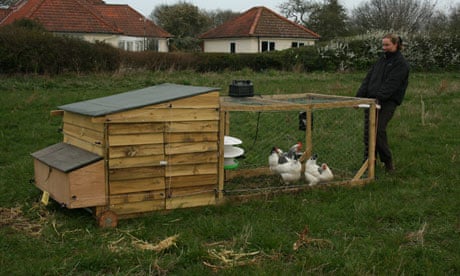Here at The Oak Tree Low Carbon Farm we face a big challenge. Our soil was the victim of industrial agriculture for decades, and as a result it was in pretty poor shape when I bought the land in 2009.
We apply all the organic matter we can lay our hands on to our soil, including manure from the next door stable yard, green manure crops such as clover, vetch and ryegrass, organic mushroom compost from a nearby grower and even silt dredged from a local pond. But it simply isn't enough.
So we have taken inspiration from the innovative pastured poultry techniques developed by Joel Salatin at Polyface Farm in Virginia. We now have some Light Sussex chickens in a pen that we move daily to give the birds access to fresh grass and clean ground.
Each day we pop some homemade wheels under the back of the pen and slowly pull it along, complete with the chickens. Indeed the chickens have learnt that the daily move brings fresh food, including grass, clover, bugs and worms, so they line up at the front of the pen in readiness!
Not only do the chickens mow the grass, they also manure the land as they go. Moving them to a clean patch every day reduces the risk of disease, and keeps the grass and clover in peak condition.
If our homemade movable pen proves successful we'll get a boyfriend for our ladies and breed both egg and meat chickens from this dual-purpose breed. We'll then move the birds, in several larger pens, in parallel across the land.
We plan to feed them as much locally grown food as possible, including the chicken superfood comfrey grown on the farm, and wheat from a neighbouring farm, to keep the carbon impact low. During the winter when the grass is dormant, we'll put the pens onto the vegetable beds. We'll move the pens across a straw covering to absorb the nitrogen rich droppings, letting our chickens clear and manure the beds ahead of the new growing season.
Joanne Mudhar runs The Oak Tree Low Carbon Farm in Ipswich, Suffolk. Click here to read more of her posts.

Comments (…)
Sign in or create your Guardian account to join the discussion